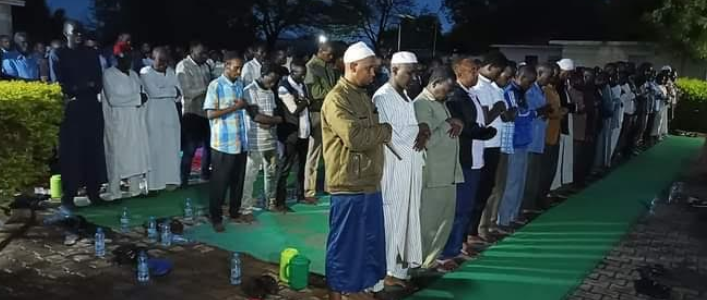Governor Louis Lobong Lojore of Eastern Equatoria State over the weekend urged Muslim traders to extend their businesses to rural villages to serve the population there and also to reduce the prices of necessities.
He was speaking Friday evening to hundreds of Muslims at the state palace during a ceremonial dinner organized to observe the holy month of Ramadan.
“There should be togetherness and unity among religions. Also, as traders, you should be realistic in your pricing. We do not want you to make losses but you should also not overprice. This will make your customers come back to you” Governor Lobong said.
“I want you to open businesses outside Torit. We do not want our people moving from Hiyalla up to Torit to buy salt of 100 SSP. They have to travel using public transport and incur other expenses,” he added. “So, we need shops to go to the villages and there should be no fear of insecurity because we are working hard to create security.”
The chairperson of the Ramadan celebrations in Torit, Abdallah Albert Oting, who doubles as minister for cabinet affairs in the state, said there is peaceful coexistence between Muslims and other religions in the state.
“There are no challenges that Muslims solely face and the problems we have are for all, like hunger and insecurity but currently there is coexistence between Muslims and Christians,” Oting said. “They move, eat and do everything together even up the home level.”
Sheik Musa Ahmed Ganduri, the chairperson of the state interreligious council and the leader of the Muslim community, welcomed the idea of opening shops in the villages but cautioned villagers against causing insecurity for traders. He cited the recent killing of a Muslim trader whose goods were then looted in Lafon County.
“We want our citizens to respect foreigners and people coming to their areas. Let them host and defend them. There was a Somali trader in Hiyalla who was attacked,” Ganduri said. “I want the civil population to protect these traders, save their lives and their properties.”
On high commodity prices, Sheik Ganduri said they had discussed the possibility of reducing them but that the high and fluctuating dollar rate is the problem.
“We talked about the reduction of prices but you know traders are not using local currency to import goods but the dollar. So, when the dollar rate goes up, the prices of goods also increase,” he explained. “The biggest crisis now is the one in Ukraine and Russia now. The whole world is affected and all prices increased even in America and we have nothing to do.”




